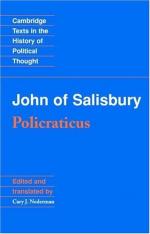|
This section contains 7,795 words (approx. 26 pages at 300 words per page) |

|
SOURCE: Scanlon, Larry. “The Public Exemplum.” In Narrative, Authority, and Power: The Medieval Exemplum and the Chaucerian Tradition, pp. 81-134. Cambridge: Cambridge University Press, 1994.
In the following excerpt, Scanlon examines John's use of classical authorities—real and fictitious—to disagree with and instruct members of the royal court.
There is no more telling instance than the Policraticus of the importance to medieval political thinking of rhetoric in general and the exemplum in particular. The most influential Fürstenspiegel of the later Middle Ages, it was also one of the period's most widely circulated exemplum collections. The exemplum provides its characteristic mode of exposition, and as I shall argue, the narrative logic that underlies the work's larger political stance. The analysis that follows will concentrate on John's characterization of the form's political parameters, and his use of exemplarity as a larger narrative logic.1
The Policraticus, subtitled De nugis curialium...
|
This section contains 7,795 words (approx. 26 pages at 300 words per page) |

|


